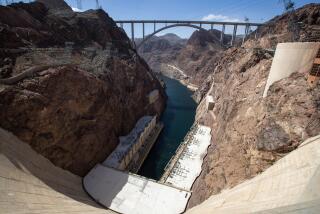City Council Members Balking at Mandatory Water Rationing : Drought: New figures showing a strong conservation effort by residents prompt some lawmakers to change their minds about backing mayor’s proposal.
- Share via
Mayor Tom Bradley’s water rationing proposal is threatened by last-minute opposition from City Council members who have been swayed by new statistics showing Los Angeles residents are voluntarily conserving enough water.
At least three council members who supported the rationing plan in a tentative vote last week say they now plan to oppose the ordinance when it is presented on Friday.
Council members Richard Alatorre, Zev Yaroslavsky and Joan Milke Flores said Tuesday that a Department of Water and Power study showing that residents cut water use by 15.5% in June has persuaded them that rationing is unnecessary at this time.
June was the third consecutive month of lower water use in Los Angeles, following reductions of 11.7% in May and 12.2% in April from expected normal demand, the DWP reported.
An informal poll of 14 of the 15 council members Tuesday shows the rationing proposal does not have enough votes for passage in its current form. In interviews, seven council members said they oppose Bradley’s rationing plan, while six said they support it. Council President John Ferraro said he is reevaluating his earlier support of the program and is now undecided. The 15th council member, Gilbert Lindsay, remains hospitalized after a fainting spell 12 days ago and could not be reached.
The ordinance requires eight votes for passage.
Another obstacle to Bradley’s plan is likely to be raised Friday, council members said. Alatorre and Flores said they plan to introduce motions that would block rationing from being imposed until voluntary conservation rates fall below the 10% that Bradley urged four months ago.
“As long as people are conserving over the level that we have asked for, why go to the expense” of a mandatory rationing program, Flores said. According to the DWP, implementation of rationing would cost more than $1 million. All residents would face a rate increase of 9 cents per billing unit--about $2 to the average residential bill--to cover the costs of the program and an estimated $22.5 million in reduced water sales.
“There’s an easy and inexpensive way to do this, and a hard and expensive way,” Yaroslavsky said. “As long as the people are willing to conserve, a voluntary program will be cheaper. . . . I’m persuaded to continue with this (voluntary) approach.”
Yaroslavsky, like most other council members, said it is clear that conservation is necessary in this fourth year of drought and with projected short supplies. But he added, “The public should be rewarded for conserving, not punished.”
Said Alatorre: “We don’t need (mandatory conservation) as long as people can do it voluntarily.”
Bradley continues to lobby for the rationing program. The mayor appeared on the Michael Jackson radio talk show Monday, telling callers that the city needs to build water reserves in case the drought drags into a fifth year.
On Tuesday, the mayor sent a letter to all council members saying the DWP conservation estimates are “falsely encouraging.” He criticized the DWP’s methodology as “imprecise” and claimed that the department cannot measure accurately how much water is used, let alone the amount of conservation.
“I would be very dubious about entrusting public policy on such a critical issue as our city’s water supply to an unrefined . . . process that uses unstable numbers,” Bradley wrote.
But DWP officials on Tuesday stood by their numbers.
Larry Gewe, senior engineer in charge of the conservation measurement project, said the figures “make intellectual sense” and are “statistically reliable.”
Larry McReynolds, DWP engineer in charge of operations, said, “There is no question about how much water is consumed . . . there is no doubt in accuracy.”
A DWP spokesman added that it was the mayor’s office that requested that the DWP develop a method of measuring conservation.
Mark Fabiani, Bradley’s chief of staff, remained confident that the program will be adopted Friday. “We feel we can convince the council that rationing is the only way that is equitable and fair” to conserve water, Fabiani said, adding, “The mayor will do whatever it takes.”
Overall, Southern California cities are conserving an average of 12%, according to a study by the Metropolitan Water District. A combination of voluntary conservation, with some mandatory restrictions--such as bans on daytime lawn-watering and hosing down driveways--has convinced many of the largest water agencies in the Southland that rationing is not necessary this year.
More to Read
Sign up for Essential California
The most important California stories and recommendations in your inbox every morning.
You may occasionally receive promotional content from the Los Angeles Times.










